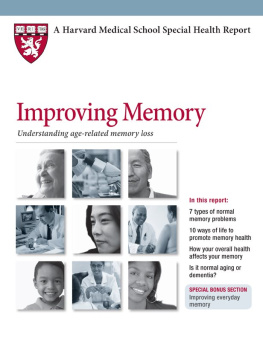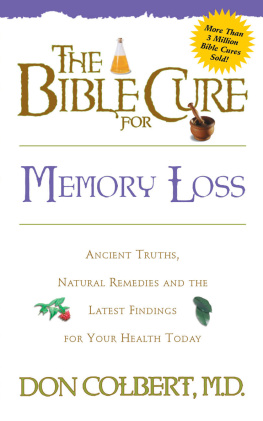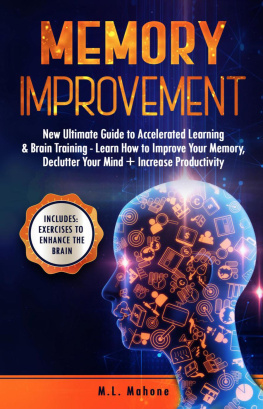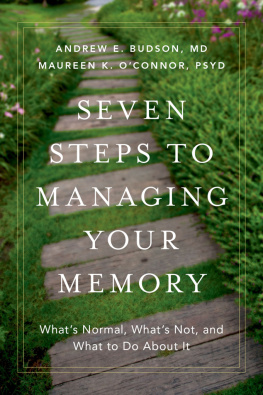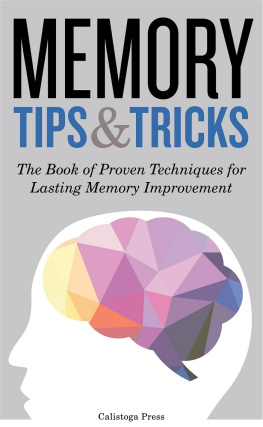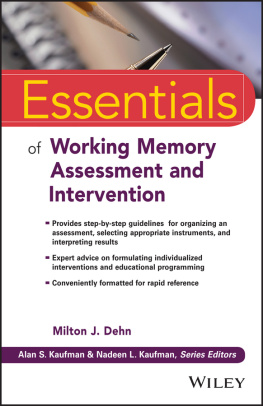Kirk R. Daffner - Improving Memory: Understanding age-related memory loss
Here you can read online Kirk R. Daffner - Improving Memory: Understanding age-related memory loss full text of the book (entire story) in english for free. Download pdf and epub, get meaning, cover and reviews about this ebook. year: 2014, publisher: BookBaby, genre: Religion. Description of the work, (preface) as well as reviews are available. Best literature library LitArk.com created for fans of good reading and offers a wide selection of genres:
Romance novel
Science fiction
Adventure
Detective
Science
History
Home and family
Prose
Art
Politics
Computer
Non-fiction
Religion
Business
Children
Humor
Choose a favorite category and find really read worthwhile books. Enjoy immersion in the world of imagination, feel the emotions of the characters or learn something new for yourself, make an fascinating discovery.
- Book:Improving Memory: Understanding age-related memory loss
- Author:
- Publisher:BookBaby
- Genre:
- Year:2014
- Rating:4 / 5
- Favourites:Add to favourites
- Your mark:
- 80
- 1
- 2
- 3
- 4
- 5
Improving Memory: Understanding age-related memory loss: summary, description and annotation
We offer to read an annotation, description, summary or preface (depends on what the author of the book "Improving Memory: Understanding age-related memory loss" wrote himself). If you haven't found the necessary information about the book — write in the comments, we will try to find it.
Improving Memory: Understanding age-related memory loss — read online for free the complete book (whole text) full work
Below is the text of the book, divided by pages. System saving the place of the last page read, allows you to conveniently read the book "Improving Memory: Understanding age-related memory loss" online for free, without having to search again every time where you left off. Put a bookmark, and you can go to the page where you finished reading at any time.
Font size:
Interval:
Bookmark:
IMPROVING MEMORY
SPECIAL HEALTH REPORT
Medical Editor
Kirk R. Daffner, M.D., FAAN
J. David and Virginia Wimberly Professor of
Neurology, Harvard Medical School
Chief, Division of Cognitive and Behavioral
Neurology, Brigham & Womens Hospital
Writer
Christine Junge
Editor, Special Health Reports
Kathleen Cahill Allison
Art Director
Heather Derocher
Production Editors
Mary Kenda Allen
Melissa Rico
Illustrators
Scott Leighton
Michael Linkinhoker
Published by Harvard Medical School
Anthony L. Komaroff, M.D., Editor in Chief
Edward Coburn, Publishing Director
Copyright 2012 by Harvard University. Written permission is required to reproduce, in any manner, in whole or in part, the material contained herein. Submit reprint requests in writing to:
Harvard Health Publications
10 Shattuck St., 2nd Floor, Boston, MA 02115
617-432-1485 Fax: 617-432-4719
Website
For the latest information and most up-to-date publication list, visit us online at www.health.harvard.edu .
Customer Service
For all subscription questions or problems (rates, subscribing, address changes, billing problems) call 877-649-9457, send an email to , or write to Harvard Health Publications, P.O. Box 9308, Big Sandy, TX 75755-9308.
Ordering Special Health Reports
Harvard Medical School publishes Special Health Reports on a wide range of topics. To order copies of this or other reports, please see the instructions at the back of this report, or go to our website: www.health.harvard.edu .
For bulk rates, corporate sales and licensing:
Belvoir Media Group
Attn: Harvard Health Publications
P.O. Box 5656
Norwalk, CT 06856-5656
email:
ISBN 978-1-61401-005-0
The goal of materials provided by Harvard Health Publications is to interpret medical information for the general reader. This report is not intended as a substitute for personal medical advice, which should be obtained directly from a physician.

Copyright Notice
This report is copyrighted by Harvard University and is protected by U.S. and international copyright. All rights reserved.
Heres what you CAN do
Print out one copy and route this original to family.
You are permitted to have one copy of this publication on your computer at any time (you cant put it on a network unless you purchased a license to do so). If you have paid for more copies, then you may have that many copies on computers at any time.
Copy, on an occasional basis, a couple of pages to give to friends, family members, or colleagues.
We are registered with the Copyright Clearance Center (CCC). You can comply with the copyright laws by paying a royalty on copies you make of passages. But not even the CCC can authorize cover-to-cover photocopying or wholesale electronic forwarding.
If you want to distribute copies of this publication, either in print or electronic form, to others on a regular basis, ask us about bulk discounts or licensing opportunities. You may be able to negotiate an agreement, for a single fee, that would enable you to legally distribute photocopies or electronic copies to others.
Heres what you CANT do
(without prior permission)
Make or forward email copies of an entire publication. The law provides for a very limited amount of copying, commonly referred to as fair use. However, cover-to-cover photocopying is forbidden.
Electronic transmission of a copyrighted work is the legal equivalent of photocopying it (and so is posting it on the Internet or in an electronic database), and is therefore not allowed.
Routinely copy and distribute portions.
Republish or repackage the contents.
Some publishers must resort to lawsuits to protect their publications. Harvard Health Publications would like to eliminate the need for such suits by helping to educate customers. We hope this outline has helped explain what is legal and what is not.
For more information
Copyright Clearance Center (CCC)
Ph: 508-750-8400
www.copyright.com
Permissions Requests
Natalie Ramm, Harvard Health Publications
Ph: 617.432.2876
Licensing, Bulk, and Corporate Sales
Tonya Phillips, Belvoir Media Group
Ph: 203-857-3148
Harvard Health Publications
Harvard Medical School
10 Shattuck Street, 2nd Floor
Boston, MA 02115-6011
www.health.harvard.edu
 Receive HEALTHbeat, Harvard Health Publications
Receive HEALTHbeat, Harvard Health Publications
FREE email newsletter
Go to www.health.harvard.edu to subscribe to HEALTHbeat. This free, weekly email newsletter brings you health tips, advice, and information on a wide range of topics.
You can also join in discussion with experts from Harvard Health Publications and folks like you on a variety of health topics, medical news, and views by reading the Harvard Health Blog ( www.health.harvard.edu/blog ).

Dear Reader,
Years ago, I saw a patient in the beginning stages of dementia. She still had moments of great clarity, and in one of those times she lamented, Im vanishing as a person. Her words have stuck with me because they seemed like such a lucid description of the impact of dementia on a person.
In many ways, our memories shape who we are. They make up our internal biographiesthe stories we tell ourselves about what weve done with our lives. Our memories tell us who were connected to, who weve touched during our lives, and who has touched us. In short, our memories are crucial to the essence of who we are as human beings.
Memory loss also affects the practical side of life. Remembering how to get from your house to the grocery store or how to do the tasks that make up your job allows you to take care of your needs. Thats what makes dementia so scarylosing your memory means both losing your ability to live independently and not being able to remember your past experiences. Its not surprising, then, that concerns about cognitive decline rank among the top fears people have as they age.
And theres no getting around the fact that the ability to remember does change with age. Many of these changes are normal, and not a sign of dementia. As youll read about in the section of this report titled Forgetting: Whats normal?, many of these changes increase as the brain ages. Unfortunately, some people have the more serious memory problems associated with dementia. We will review the different forms of dementia, too.
If your memory is still healthyeven if youre forgetting a bit more than youd likenows the time to commit to protecting your brain from ill consequences. When it comes to the brain, one key to successful aging is what experts call cognitive reserve, the brains capacity to withstand damage associated with disease or injury. Although scientists once thought that the adult brain did not grow new brain cells (neurons), we now know that the brain keeps making new cells and connections throughout life. This plasticity, or ability to change, means that you may be able to have an impact on neuronal growth. This report discusses some new research on this subject and gives examples of memory strategies that may help.
Next pageFont size:
Interval:
Bookmark:
Similar books «Improving Memory: Understanding age-related memory loss»
Look at similar books to Improving Memory: Understanding age-related memory loss. We have selected literature similar in name and meaning in the hope of providing readers with more options to find new, interesting, not yet read works.
Discussion, reviews of the book Improving Memory: Understanding age-related memory loss and just readers' own opinions. Leave your comments, write what you think about the work, its meaning or the main characters. Specify what exactly you liked and what you didn't like, and why you think so.

